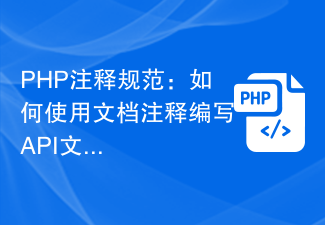 Backend Development
Backend Development PHP Tutorial
PHP Tutorial Detailed explanation of PHP comment syntax specifications and naming conventions
Detailed explanation of PHP comment syntax specifications and naming conventionsComments are very important in the process of writing code. Good comments can make your code easier to read. When writing code, you must pay attention to the specifications of comments. Here is a summary for everyone. Friends who need it can refer to it. Down.
HP Comment Specification
Comments are very important in the process of writing code. Good comments can make your code easier to read. Be sure to read it when writing code. Pay attention to the specification of comments.
"PHP is an extremely easy language to get started with. A novice who has just started may be able to use echo to print out a hello world in less than a few minutes! But is he a real programmer? How to do it? What about defining a programmer? If you want to truly become a programmer, you must follow a set of program writing specifications."
We often write some functions, but these functions may only be understood by ourselves, or even It’s been a while since I didn’t recognize what I wrote, so what should I do? The best way is of course to add comments to your code.
We may be familiar with many ways of writing comments, C pear PHP comments, etc., but the main ones we use are # and /**/.
# is a short comment method. Maybe you will use it to annotate a variable or call a method. /**/. We may still use it to comment out a large section of code. , but how to use it to standardly annotate a function?
/** * @name 名字 * @abstract 申明变量/类/方法 * @access 指明这个变量、类、函数/方法的存取权限 * @author 函数作者的名字和邮箱地址 * @category 组织packages * @copyright 指明版权信息 * @const 指明常量 * @deprecate 指明不推荐或者是废弃的信息 * @example 示例 * @exclude 指明当前的注释将不进行分析,不出现在文挡中 * @final 指明这是一个最终的类、方法、属性,禁止派生、修改。 * @global 指明在此函数中引用的全局变量 * @include 指明包含的文件的信息 * @link 定义在线连接 * @module 定义归属的模块信息 * @modulegroup 定义归属的模块组 * @package 定义归属的包的信息 * @param 定义函数或者方法的参数信息 * @return 定义函数或者方法的返回信息 * @see 定义需要参考的函数、变量,并加入相应的超级连接。 * @since 指明该api函数或者方法是从哪个版本开始引入的 * @static 指明变量、类、函数是静态的。 * @throws 指明此函数可能抛出的错误异常,极其发生的情况 * @todo 指明应该改进或没有实现的地方 * @var 定义说明变量/属性。 * @version 定义版本信息 */
The information in the comments is very comprehensive. There may be a lot of information that we don’t use. The red parts are the ones we often use.
Example: Several common comment methods in php:
1. Comments on the file, introducing the file name, function, author version number and other information
/** * 文件名简单介绍 * * 文件功能 * @author 作者 * @version 版本号 * @date 2020-02-02 */
File header Template
/** *这是一个什么文件 * *此文件程序用来做什么的(详细说明,可选。)。 * @author richard<e421083458@163.com> * @version $Id$ * @since 1.0 */
2. Class comments, class name and introduction
/** * 类的介绍 * * 类的详细介绍(可选) * @author 作者 * @version 版本号 * @date 2020-02-02 */
/**
* 类的介绍
*
* 类的详细介绍(可选。)。
* @author richard<e421083458@163.com>
* @since 1.0
*/
class Test
{
}3. Function comments, function function, parameter introduction and return type
/** * 函数的含义说明 * * @access public * @author 作者 * @param mixed $arg1 参数一的说明 * @param mixed $arg2 参数二的说明 * @return array 返回类型 * @date 2020-02-02 */
Function header Comments
/**
* some_func
* 函数的含义说明
*
* @access public
* @param mixed $arg1 参数一的说明
* @param mixed $arg2 参数二的说明
* @param mixed $mixed 这是一个混合类型
* @since 1.0
* @return array
*/
public function thisIsFunction($string, $integer, $mixed) {return array();}
Program code comments
1. The principle of comments is to explain the problem clearly, not more is better.
2. Several statements are used as a logical code block, and the comments of this block can be used in /* */ mode.
3. For comments specific to a certain statement, you can use end-of-line comments: //.
/* 生成配置文件、数据文件。*/ $this->setConfig(); $this->createConfigFile(); //创建配置文件 $this->clearCache(); // 清除缓存文件 $this->createDataFiles(); // 生成数据文件 $this->prepareProxys(); $this->restart();
PHP naming convention
1. Directories and files
Use lowercase underscores for directories
Class libraries, function files are uniformly .php The file names of classes with the suffix
are all defined in namespaces, and the path of the namespace is consistent with the path of the class library file
Class files are named using camel case (the first letter is capitalized), and other files are named with lowercase underscores
The class name and class file name should be consistent, and uniformly use camel case (the first letter is capitalized)
2. Function and class, attribute naming
The class name should use camel case (the first letter is capitalized), for example User, UserType, do not need to add a suffix by default. For example, UserController should be named directly as User
. Use lowercase letters and underscores (starting with a lowercase letter) when naming functions. For example, use camel case (first letter) when naming the get_client_ip
method. Lowercase), such as getUserName (if the method has a return value, it is currently customary to use lowercase attribute types with the first letter, such as s (string), i (int), f (float), b (boolean), a (array) etc.)
Use camel case naming of attributes (the first letter is lowercase), such as tableName, instance (it is currently customary to use lowercase attribute types with the first letter, such as s (string), i (int), f (float), b(boolean), a(array), etc.)
Functions or methods starting with double underscore "__" are used as magic methods, such as __call and __autoload
3. Constants and configuration
Constant names are named with uppercase letters and underscores, such as APP_PATH and THINK_PATH
Configuration parameters are named with lowercase letters and underscores, such as url_route_on and url_convert
4. Data table box field
Data table and fields are named in lowercase and underlined, and note that field names do not start with an underscore, such as the think_user table and user_name field. It is not recommended to use camel case and Chinese as data table field names.
The above is the detailed content of Detailed explanation of PHP comment syntax specifications and naming conventions. For more information, please follow other related articles on the PHP Chinese website!
 PHP注释大揭秘:单行注释和多行注释详细对比Mar 15, 2024 pm 12:51 PM
PHP注释大揭秘:单行注释和多行注释详细对比Mar 15, 2024 pm 12:51 PMPHP注释大揭秘:单行注释和多行注释详细对比PHP是一种广泛应用的网页开发语言,其中注释的使用对于代码的可读性和维护性起着至关重要的作用。在PHP中,常见的注释有单行注释和多行注释两种形式。本文将详细对比这两种注释形式,并提供具体的代码示例,帮助读者更好地理解它们的用法和差异。一、单行注释单行注释是在代码中添加一行注释,以//开头,直到行尾为止。单行注释
 php注释的种类有哪些Aug 23, 2023 pm 01:46 PM
php注释的种类有哪些Aug 23, 2023 pm 01:46 PMphp注释的种类有单行注释、多行注释、文档注释和条件注释等。详细介绍:1、单行注释以双斜杠“//”开头,用于注释单行代码,在这种注释类型中,从双斜杠开始到该行末尾的所有内容都将被视为注释,不会被解释为代码;2、多行注释以斜杠星号“/”开头,以星号斜杠“*/”结尾,这种注释类型可用于注释一段代码或多行代码;3、文档注释也以斜杠星号“/”开头,以星号斜杠“*/”结尾等等。
 PHP中的代码注释May 23, 2023 am 08:27 AM
PHP中的代码注释May 23, 2023 am 08:27 AM代码注释是程序员在编写代码时添加的文本提醒,以便自己和其他程序员更轻松地阅读和理解代码。在PHP中,代码注释是不可或缺的。本文将详细介绍PHP中的代码注释的类型、规范和用途。一、PHP中的代码注释类型在PHP中,有三种类型的注释:单行注释、多行注释和文档注释。单行注释单行注释以双斜线“//”开始,直到行尾结束。例如://这是一个单行注释多行注释多行注释以“
 PHP注释类型详解:单行注释与多行注释Mar 15, 2024 pm 05:27 PM
PHP注释类型详解:单行注释与多行注释Mar 15, 2024 pm 05:27 PMPHP是一种流行的服务器端脚本语言,广泛应用于Web开发领域。在代码编写过程中,注释是一个非常重要的元素,可以帮助开发者更好地理解代码,提高代码的可读性和可维护性。本文将详细介绍PHP中的注释类型,包括单行注释与多行注释,同时提供具体的代码示例。单行注释在PHP中,使用双斜杠//可以实现单行注释。单行注释从//开始一直到该行的末尾。单行注释通常用于对代码进行
 php的注释种类有哪些Jul 25, 2023 pm 02:26 PM
php的注释种类有哪些Jul 25, 2023 pm 02:26 PMphp的注释种类有:1、单行注释,用于解释某个功能、提醒其他开发者或自己注意点等;2、多行注释,用于对多行代码块进行详细的说明;3、文档注释,用于对整个代码块或函数、方法进行详细的说明。
 深入了解PHP注释:单行注释和多行注释的区别Mar 15, 2024 pm 05:15 PM
深入了解PHP注释:单行注释和多行注释的区别Mar 15, 2024 pm 05:15 PM进入PHP编程领域,注释是一个非常重要的概念。在编写代码时,注释对于阐述代码意图、帮助其他开发者理解代码逻辑以及方便自己日后维护代码都是至关重要的。在PHP中,注释分为单行注释和多行注释两种,在使用上有一些区别。本文将深入探讨PHP注释的特点以及单行注释和多行注释的使用方式,并通过具体的代码示例进行说明。1.单行注释单行注释是在代码中添加一行注释,用来解释
 如何在PHP中使用注释来增强代码可读性和理解性Jul 15, 2023 pm 09:27 PM
如何在PHP中使用注释来增强代码可读性和理解性Jul 15, 2023 pm 09:27 PM如何在PHP中使用注释来增强代码可读性和理解性引言:在开发过程中,注释是一个非常重要的组成部分,可以帮助开发者更好地理解代码,提高代码的可读性和维护性。本文将介绍在PHP中如何使用注释来增强代码的可读性和理解性,并提供一些实际的代码示例。单行注释单行注释是用来对代码的某一行进行解释和说明。在PHP中,单行注释以双斜杠(//)开头,直到行尾结束。下面是一个示例
 PHP注释规范:如何使用文档注释编写API文档Jul 30, 2023 pm 07:00 PM
PHP注释规范:如何使用文档注释编写API文档Jul 30, 2023 pm 07:00 PMPHP注释规范:如何使用文档注释编写API文档引言:在开发PHP应用程序时,编写完善的API文档对于开发团队和其他开发者来说非常重要。好的文档可以提高代码的可读性和可维护性,并促进团队合作与信息共享。本文将介绍如何使用文档注释编写PHP的API文档,并提供一些示例代码帮助读者理解如何规范地编写注释。注释规范在PHP中,我们使用注释来对代码进行说明和描述。一般


Hot AI Tools

Undresser.AI Undress
AI-powered app for creating realistic nude photos

AI Clothes Remover
Online AI tool for removing clothes from photos.

Undress AI Tool
Undress images for free

Clothoff.io
AI clothes remover

AI Hentai Generator
Generate AI Hentai for free.

Hot Article

Hot Tools

PhpStorm Mac version
The latest (2018.2.1) professional PHP integrated development tool

DVWA
Damn Vulnerable Web App (DVWA) is a PHP/MySQL web application that is very vulnerable. Its main goals are to be an aid for security professionals to test their skills and tools in a legal environment, to help web developers better understand the process of securing web applications, and to help teachers/students teach/learn in a classroom environment Web application security. The goal of DVWA is to practice some of the most common web vulnerabilities through a simple and straightforward interface, with varying degrees of difficulty. Please note that this software

SecLists
SecLists is the ultimate security tester's companion. It is a collection of various types of lists that are frequently used during security assessments, all in one place. SecLists helps make security testing more efficient and productive by conveniently providing all the lists a security tester might need. List types include usernames, passwords, URLs, fuzzing payloads, sensitive data patterns, web shells, and more. The tester can simply pull this repository onto a new test machine and he will have access to every type of list he needs.

Safe Exam Browser
Safe Exam Browser is a secure browser environment for taking online exams securely. This software turns any computer into a secure workstation. It controls access to any utility and prevents students from using unauthorized resources.

MinGW - Minimalist GNU for Windows
This project is in the process of being migrated to osdn.net/projects/mingw, you can continue to follow us there. MinGW: A native Windows port of the GNU Compiler Collection (GCC), freely distributable import libraries and header files for building native Windows applications; includes extensions to the MSVC runtime to support C99 functionality. All MinGW software can run on 64-bit Windows platforms.





